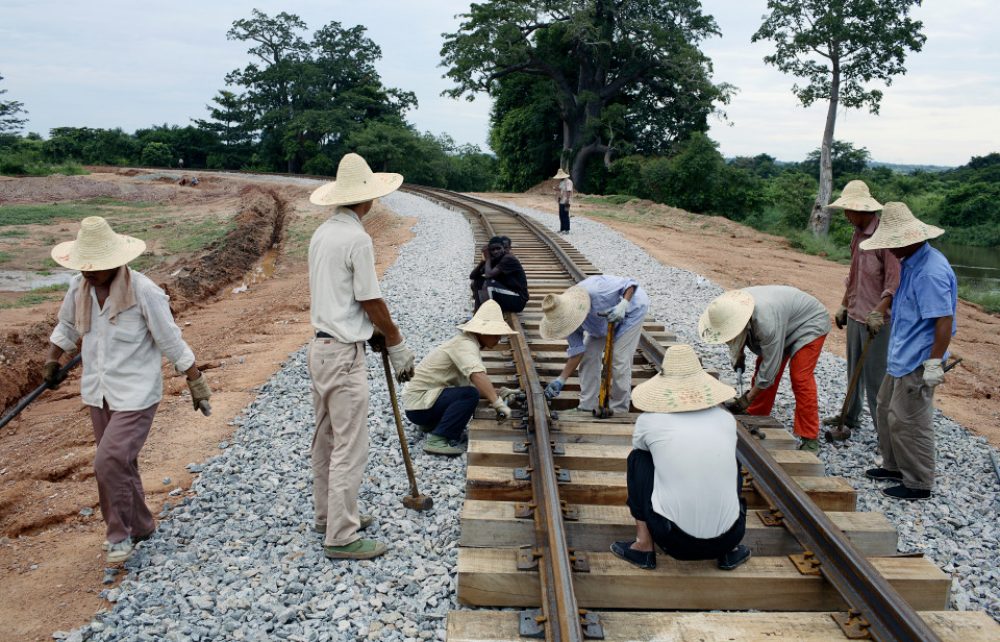Amid one of the most serious economic crises of its history, Angola’s government is looking at every major economy for investors. Being Angola’s major creditor for over a decade, China is, naturally, one of the main targets. But Chinese investment is being plagued locally, not only by the dire economic conditions, but also insecurity and demands for bribes by local authorities.
A new report commissioned by the Chinese Embassy in Luanda to the Catholic University of Angola (UCAN) Center for Studies and Scientific Research, highlights the case of Guangde Internacional Group, LDA as a relevant example of Chinese investors generating wealth, jobs, wages and exports in the local economy. But after having visited the group’s facilities and talked to the entrepreneurs, the researchers also point to the difficulties faced in investing.
These include “excessive supervision” by “several government entities.” Instead of demanding improvements, these entities reveal to have the “sole goal of setting fines and collecting ‘gasosas’”, or ‘bribes’ in the local slang.
This is consistent with Angola’s low ranking in international business environment rankings, among the lowest in the world. Corruption and bribes are a frequent complaint from not only of foreign businessmen, but also local ones. Indeed, gasosas have plagued even simple drivers, stopped by the local police or customs officials.
Another issue for Chinese businessmen cited in UCAN’s report is theft by criminal gangs. This has been, generally, on the rise and researchers found that addressing this issue was a precondition for investors to pick Angola as an investment destination.
Due to the contraction in the Angolan economy since 2016, the Chinese community in Angola has been declining steeply. Many of the major construction companies active in the country since 2002 have repatriated workers, as their contracts are concluded.
According to our sources, one of the most active Chinese companies in the construction market, China Jiangsu International (linked to the Ministry of Interior) has already carried out the repatriation of 2,200 workers. Another Chinese company, CITIC Construction, was forced to suspend, due to lack of financing, a project in the process of completion – the urbanisation of Futungo de Belas.
UCAN’s report also investigates one of the major criticisms made of Chinese companies in Angola, and in Africa in general: that most jobs in Chinese projects are given to Chinese workers. Researchers found that Chinese companies are in fact creating the most jobs for locals, a finding cited in a 2019 investigation by Angolan researchers Carlos Oya and Fernandes Wanda.
According to Oya and Wanda, Chinese companies generally pay lower wages to unqualified workers (24.993 kwanza/month) than Angolan companies and Western ones (37.181 kwanza/month). Semi-qualified workers, however, are paid about the same monthly salary in Chinese companies (63.971 kwanza) and others (62.671 kwanza).
Their report also found that working conditions for Angolan workers in Chinese companies can be improved. In general, it adds, payments to workers’ pensions are not made. But Chinese companies are lauded for creating jobs in a country where unemployment is at 29 per cent (3.7 million people).
While Angola’s president has criticised public credits secured by oil supplies, as China has offered since 2002, the Chinese government has shown less flexibility. The crisis that Angola is going through advises the state to “maximise” the use of oil as a means of obtaining immediate foreign exchange, which is the reason for its refusal to mortgage parts of its production as a counterpart to Chinese credits.
In the context of continued economic and financial deterioration as a result of the dragging of oil revenues, the financial assistance provided by China has proved to be essential for the financing of the state and the maintenance of public investment.
UCAN’s report sets Angolan debt to China at US$22.8 billion, nearly half of the total foreign debt. This represents a decline since 2017, both in financial terms (US$23.2 billion) and proportion of overall debt (53.5%), as Angola works to honour its debts. In October 2018, China Development Bank opened a US$2 billion credit line for priority projects set by the Angolan government.
Other than Angola’s main creditor, China has been, since 2007, the main buyer of Angolan goods – mostly due to oil exports. In 2016, two-thirds of Angolan oil exports went to China, and the total is rising in 2019, to 68 per cent.
China has also been an important supplier of goods, and topped the list in 2018, with 14 per cent of the total, ahead of Portugal (13%). This year, France is number one, with 36 per cent, followed by China (13%). The balance of trade with China has been historically favourable to Angola.
But while Angola sells oil and other commodities to China, it imports industrial goods with greater added value. This has led Angolan authorities to push for Chinese industrial investment, generating much-needed jobs and exports, which increase the currency inflow. According to the report, increased productivity and competitiveness of Angolan products – with Chinese investment – would assist in generating revenue for the state, at a time when it is constrained by debt.
UCAN’s report postulates that, due to the sizeable trade between the two countries, a currency conversion agreement is justified. This would allow for businessmen to use Angolan or Chinese currencies, instead of the US dollar or the euro. Government and central banks are encouraged in the report to start working on the terms of such an agreement.




